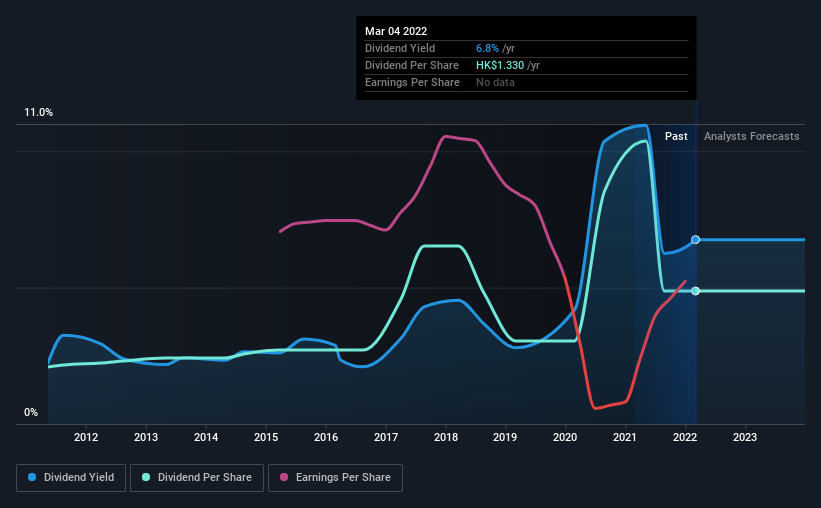Great Eagle Holdings Limited's (HKG:41) investors are due to receive a payment of HK$1.00 per share on 21st of June. This means that the annual payment will be 6.8% of the current stock price, which is in line with the average for the industry.
Check out our latest analysis for Great Eagle Holdings
Great Eagle Holdings' Distributions May Be Difficult To Sustain
We like a dividend to be consistent over the long term, so checking whether it is sustainable is important. Great Eagle Holdings isn't generating any profits, and it is paying out a very high proportion of the cash it is earning. This is quite a strong warning sign that the dividend may not be sustainable.
Looking forward, earnings per share could 53.6% over the next year if the trend of the last few years can't be broken. This means the company will be unprofitable and managers could face the tough choice between continuing to pay the dividend or taking pressure off the balance sheet.

Dividend Volatility
While the company has been paying a dividend for a long time, it has cut the dividend at least once in the last 10 years. The first annual payment during the last 10 years was HK$0.57 in 2012, and the most recent fiscal year payment was HK$1.33. This works out to be a compound annual growth rate (CAGR) of approximately 8.8% a year over that time. It's good to see the dividend growing at a decent rate, but the dividend has been cut at least once in the past. Great Eagle Holdings might have put its house in order since then, but we remain cautious.
Dividend Growth Potential Is Shaky
Given that the dividend has been cut in the past, we need to check if earnings are growing and if that might lead to stronger dividends in the future. Great Eagle Holdings' EPS has fallen by approximately 54% per year during the past five years. A sharp decline in earnings per share is not great from from a dividend perspective. Even conservative payout ratios can come under pressure if earnings fall far enough.
We're Not Big Fans Of Great Eagle Holdings' Dividend
Overall, while some might be pleased that the dividend wasn't cut, we think this may help Great Eagle Holdings make more consistent payments in the future. The company's earnings aren't high enough to be making such big distributions, and it isn't backed up by strong growth or consistency either. We don't think that this is a great candidate to be an income stock.
Companies possessing a stable dividend policy will likely enjoy greater investor interest than those suffering from a more inconsistent approach. Still, investors need to consider a host of other factors, apart from dividend payments, when analysing a company. To that end, Great Eagle Holdings has 2 warning signs (and 1 which is significant) we think you should know about. Looking for more high-yielding dividend ideas? Try our collection of strong dividend payers.
New: Manage All Your Stock Portfolios in One Place
We've created the ultimate portfolio companion for stock investors, and it's free.
• Connect an unlimited number of Portfolios and see your total in one currency
• Be alerted to new Warning Signs or Risks via email or mobile
• Track the Fair Value of your stocks
Have feedback on this article? Concerned about the content? Get in touch with us directly. Alternatively, email editorial-team (at) simplywallst.com.
This article by Simply Wall St is general in nature. We provide commentary based on historical data and analyst forecasts only using an unbiased methodology and our articles are not intended to be financial advice. It does not constitute a recommendation to buy or sell any stock, and does not take account of your objectives, or your financial situation. We aim to bring you long-term focused analysis driven by fundamental data. Note that our analysis may not factor in the latest price-sensitive company announcements or qualitative material. Simply Wall St has no position in any stocks mentioned.
About SEHK:41
Great Eagle Holdings
An investment holding company, invests in, develops, leases, and manages residential, office, industrial, and hotel properties in Hong Kong, the United States, Canada, the United Kingdom, Australia, New Zealand, Mainland China, and internationally.
Fair value with mediocre balance sheet.
Similar Companies
Market Insights
Community Narratives




